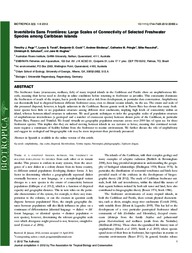Invertébrés sans frontières: large scales of connectivity of selected freshwater species among Caribbean Islands.
Invertébrés sans frontières: large scales of connectivity of selected freshwater species among Caribbean Islands.
Author(s): PAGE, T. J.; TORATI, L. S.; COOK, B. D.; BINDERUP, A.; PRINGLE, C. M.; REUSCHEL, S.; SCHUBART, C. D.; HUGHES, J. M.
Summary: The freshwater fauna (crustaceans, molluscs, fish) of many tropical islands in the Caribbean and Pacific share an amphidromous lifecycle, meaning their larvae need to develop in saline conditions before returning to freshwater as juveniles. This community dominates the freshwaters of much of the tropics, but is poorly known and at risk from development, in particular dam construction. Amphidromy can theoretically lead to dispersal between different freshwater areas, even to distant oceanic islands, via the sea. The extent and scale of this presumed dispersal, however, is largely unknown in the Caribbean. Recent genetic work in Puerto Rico has shown that many freshwater species have little or no population structure among different river catchments, implying high levels of connectivity within an island, whereas between-island structure is unknown. We used genetic techniques to infer the geographic scales of population structure of amphidromous invertebrates (a gastropod and a number of crustacean species) between distant parts of the Caribbean, in particular Puerto Rico, Panama and Trinidad. We found virtually no geographic population structure across over 2000 km of open sea for these freshwater species. This implies that they are indeed moving between islands in sea currents as larvae, meaning that continued recruitment requires a continuum of healthy habitat from the freshwater to marine environment. We further discuss the role of amphidromy and suggest its ecological and biogeographic role may be more important than previously presumed.
Publication year: 2012
Types of publication: Journal article
Keywords: Crustacea, Crustáceo, Fish, Freshwater, Macrobrachium, Molluscs, Molusco, Peixe, Phylogeography, Água doce
Observation
Some of Embrapa's publications are published as ePub files. To read them, use or download one of the following free software options to your computer or mobile device. Android: Google Play Books; IOS: iBooks; Windows and Linux: Calibre.
Access other publications
Access the Agricultural Research Database (BDPA) to consult Embrapa's full library collection and records.
Visit Embrapa Bookstore to purchase books and other publications sold by Embrapa.

